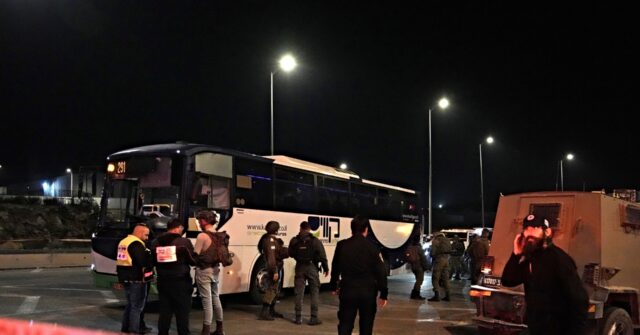On a tragic Thursday morning, a Palestinian terrorist opened fire on an Israeli bus in the West Bank, resulting in the death of a 12-year-old boy and injuries to three others. The Israeli military swiftly responded by launching a manhunt for the gunman, setting up roadblocks and encircling the area around the Palestinian city of Bethlehem to locate him. Emergency services reported that the critically injured child was later identified as Yehoshua Aharon Tuvia Simha, who passed away in a Jerusalem hospital shortly after the attack. This incident adds to the ongoing violence and tension in the region, particularly between Israeli and Palestinian communities.
The bus attack took place near the Palestinian town of al-Khader when the gunman targeted the vehicle, injuring the passengers onboard. Besides the tragic death of Tuvia, a woman sustained moderate wounds, while two others suffered lighter injuries. The attack, labeled as terrorism by Israeli authorities, has heightened concerns about safety in the West Bank and reignited discussions around the ongoing conflict between Israelis and Palestinians. The immediate response from Israeli security forces was characterized by heightened vigilance and military pressure in the surrounding areas, emphasizing the precarious security situation.
The perpetrator of the attack, later identified as Ezz Aldin Malluh from Beit Awwa near Hebron, ultimately surrendered to the authorities following the assault. This turn of events highlights the complexities surrounding individual actions in a broader context of conflict. While Israeli Defense Forces (IDF), Shin Bet (the internal security agency), and police coordinated their search for Malluh, the government’s response included both military action and communication aimed at the public to reassure them of ongoing security efforts. This incident is a stark reminder of the fragility of peace in the region and the persistent threat of violence.
In the wake of this tragedy, Israeli President Isaac Herzog expressed his condolences and offered support to Tuvia’s family and friends. He recounted that the young boy had been returning from an unspecified family celebration when he was shot, underscoring the senseless nature of such an act of violence. Herzog’s statement aimed not only to honor the victim but also to rally the community and the security forces. He called for strength among the residents of Gush Etzion and recognized the challenges faced by the IDF soldiers and security personnel who are involved in operations in high-pressure environments.
The incident sparked discussions about the psychological impact on communities affected by such attacks. The loss of a young life, particularly in a brutal and unexpected manner, reverberates throughout Israeli society, eliciting feelings of sorrow, anger, and fear. Many Israelis are left grappling with the reality of living under constant threat, reflecting a broader pattern within the region’s ongoing conflict. The response from leaders aims to provide some assurance of security while acknowledging the toll that such violence takes on families and communities.
As the situation continues to evolve, the international community watches closely. Events like the bus attack serve as a stark reminder of the complexities and challenges inherent in resolving the Israeli-Palestinian conflict. While immediate military responses may provide temporary security, the deeper issues fueling violence—such as territorial disputes, national identity, and historical grievances—remain largely unaddressed. Moving forward, it is imperative for both sides to engage in dialogue and seek a path toward peace, emphasizing the need for understanding and coexistence to prevent further tragedies in the future.

